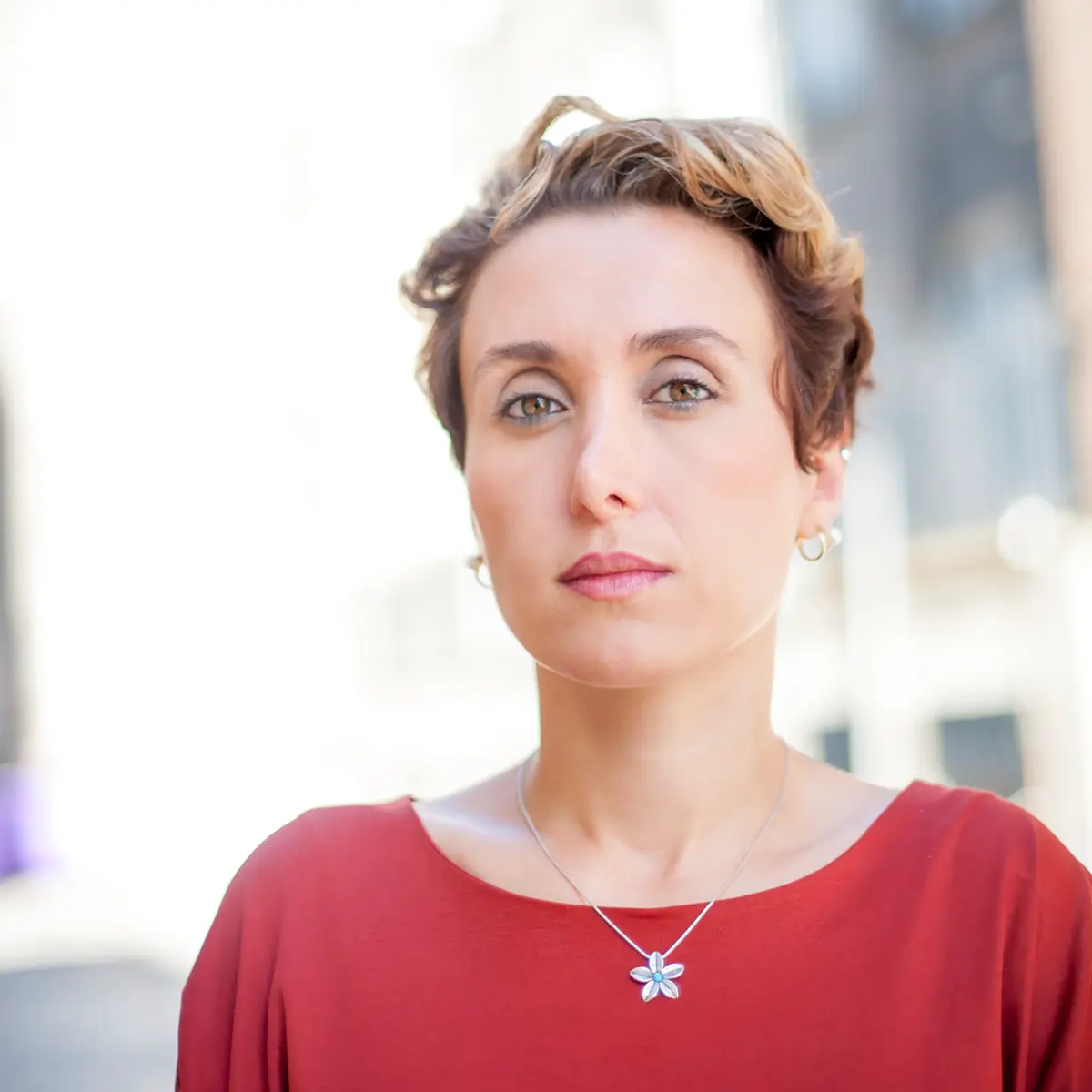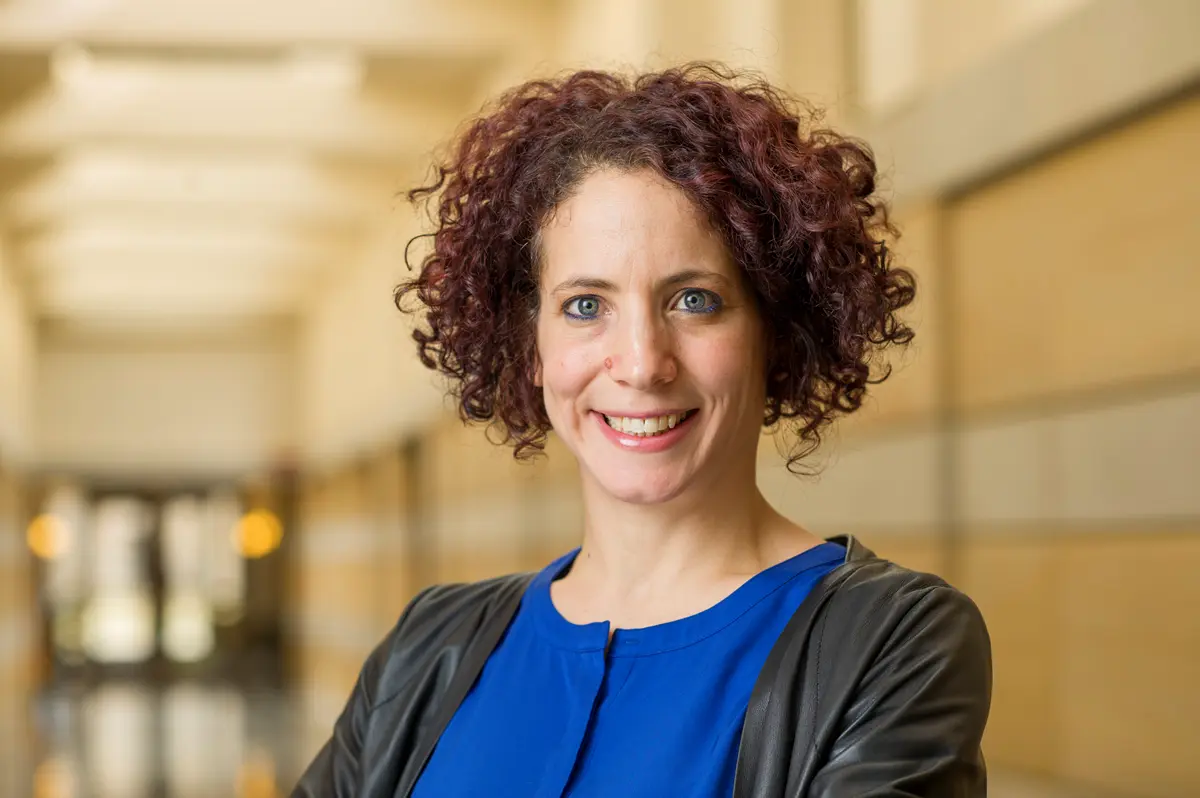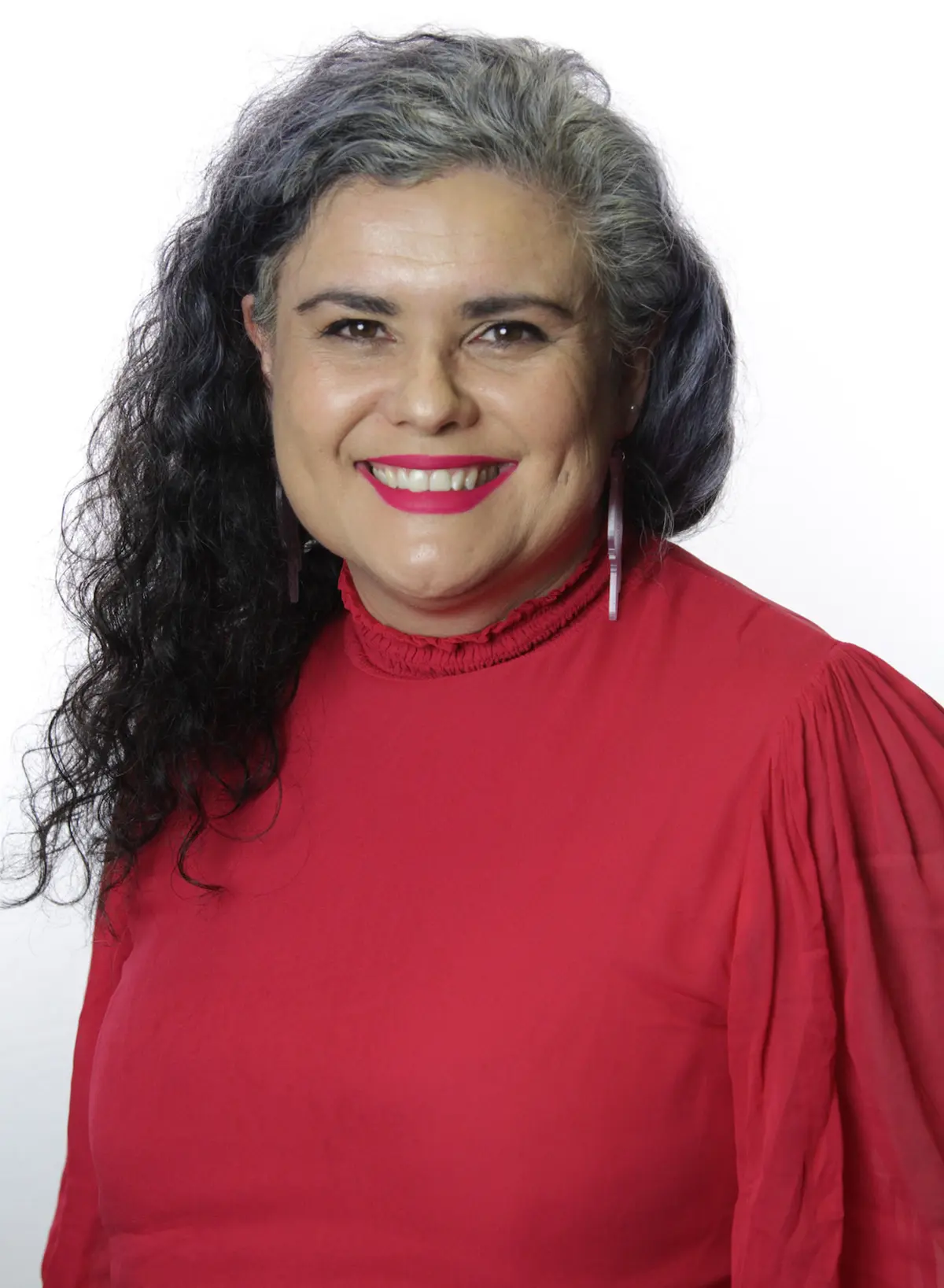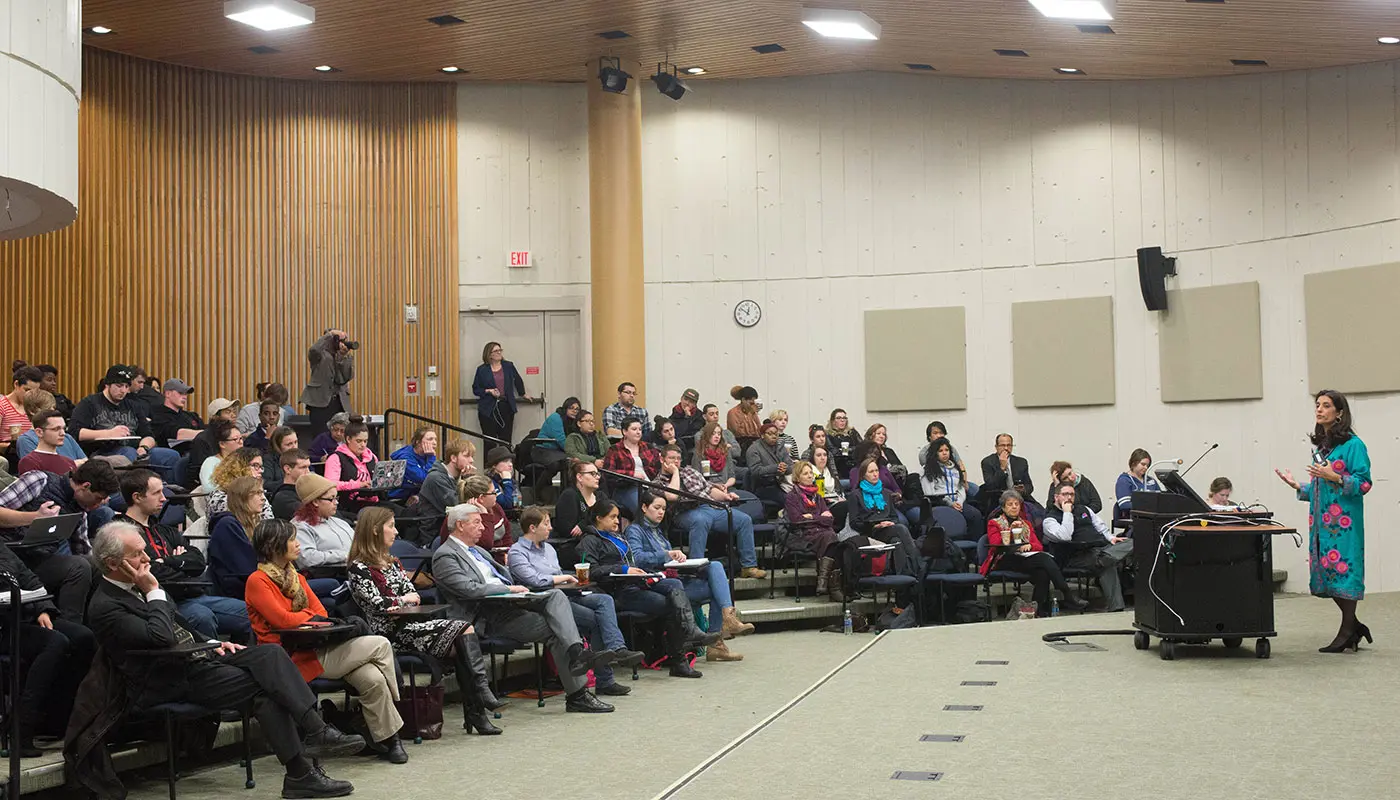The Greeley Scholar for Peace Studies award honors a distinguished advocate for peace, noted humanitarian, or faith leader who is asked to serve in limited residency at the University of Massachusetts Lowell during one semester each year. Support the Endowment.
Imagining new possibilities with feminist and queer resistance
Understanding the complex interplay of race, class, sexuality, gender, and colonial-imperial legacies is the cornerstone to building more just and equitable futures. The 2023-2024 Greeley Peace Scholar Program seeks to illuminate emerging trends and foster meaningful dialogues with scholars, activists, and artists leading the charge in feminist and queer resistance globally. Through these dialogues, we aspire to explore the transformative potential of feminist and queer resistance as it shapes diverse fields such as the creative arts, disability justice, labor organizing, policy advocacy, abolition, and beyond. This year-long series of events will culminate in the 2024 Greeley Scholar visit, featuring Professor Fatemeh Shams, an Iranian literary scholar, poet, and intersectional feminist activist. Currently, Professor Shams serves as Associate Professor of Persian literature and gender studies at the University of Pennsylvania.

About Fatemeh Shams
Fatemeh Shams is an Iranian literary scholar, poet, and intersectional feminist activist who currently serves as associate professor of Persian literature and gender studies at the University of Pennsylvania. Her scholarship lies at the intersections of sociology, gender studies and literature with a focus on literary production as a politicizing practice. Her critical monograph, "A Revolution in Rhyme: Poetic Co-Option Under the Islamic Republic" (Oxford University Press, 2021) is a groundbreaking account of literary canon formation under the autocratic rule of the Islamic Republic in comparison with the Soviet experience. Her essays address questions of gendered literary historiography, womanhood, threshold and sensory representations of exilic identity in the Persianate world and beyond through a comparative lens.
Shams was born in Mashhad where she also developed her love of literature as a child. Her mother’s underground library was a safe refuge to cope with the harsh realities of a conservative political and religious environment. Winning the silver medal of Iran’s National Olympiad of Literature at the age of 16 solidified her passion and commitment to literature. Her bachelor’s years, first at the Department of Persian Literature, and then at the Department of Social Sciences of Tehran University were formative in shaping her disciplinary approach to the study of literature as well as her dedication to activism in Iran’s student movement.
Shams immigrated to the United Kingdom to pursue her higher education first at the Institute for the Study of Muslim Civilizations in London and later as a Clarendon scholar at the Department of Oriental Studies, University of Oxford. She taught Persian language and literature at University of Oxford, and later at the School of Oriental and African Studies as well as Courtauld Institute of Art in London before moving to the United States to teach Persian literature at UPenn.
Shams has been living in exile since June 2009 and her lived experience has served as a springboard for her poetic creativity and her feminist activism. In the span of the past two decades, Shams has tirelessly advocated for political change, structural justice and gender equality with a specific focus on the Iranian and Afghan women’s right to bodily and intellectual freedom and autonomy. In 2009, in months preceding the controversial presidential election which brought Mahmoud Ahmadinejad to power for his second turn, Shams played an active role in Iran’s youth movement. Following the rise of the Green Movement in Iran, she and her family members have faced multiple phases and forms of persecution, incarceration and exile. Over the years Shams has been been a vocal voice of the opposition movement in diaspora and a woman’s rights advocate at the forefront of Iran’s feminist resistance movement since the rise of Woman, Life, Freedom Movement in the aftermath of Mahsa Amini’s state murder in September 2022. She has been a regular critic of women’s condition in Iran and her interviews and opinions have been featured in the New Yorker, theNewYorkTimes, theGuardian, NPR, and elsewhere.
In October 2022, Shams joined a group of Iranian feminists and queer activists to draft Iran’s Women’s Bill of Rights for “Woman, Life, Freedom” movement. The Bill addresses, for the first time, the purposeful and systemic exclusion of women from corridors of power and decision-making in Iran and offers a tangible legal framework and logistics for the elimination of institutionalized and cultural forms of violence and discrimination against women.
In 2023, she further expanded her professional feminist activism by joining the board of directors of Women’s Learning Partnership (WLP), an international network consisting of 20 autonomous women’s rights organizations in the Global South that promotes women’s leadership and human rights.
Shams’s poetry engages the fundamental struggles of her era: tyranny, sexual violence, bodily autonomy, alienation, forced displacement, and loss of the mother tongue. Writing in a wide range of forms from classic styles to prose poetry, Shams constantly moves beyond rigid boundaries of form and language to write about hunting memories of childhood and coming of age in her hometown and the experience of living in exile and her struggle for gender justice. Her literary honors and awards include Jaleh Esfahani Poetry Award in 2013, Latifeh Yarshater Prize in 2016, Poetry International Chapbook Prize in 2023 among others. In her bilingual collection, When They Broke Down the Door translated from Persian by Dick Davis, Shams delves into the highly personal along with the struggles of post-revolution Iran. Her poems and literary essays have been featured in the Poetry Magazine, Michigan Quarterly Review, London Poetry Magazine, World Literature Today, Penguin Book of Feminist Verse, and Penguin Anthology of Persian Women Poets, and elsewhere.
More recently, Shams was awarded a Humboldt Foundation fellowship and spent 18 months at the Forum Transregionale Studien in Berlin and Marburg University where she conducted archival work on her new monograph which focuses on modern Iranian exile poetry. The chapbook of her poems on and about her lived experience in Berlin will be published by Ugly Duckling Presse and Faslchrum in 2024.
Join us for "Degrees of Incarceration," a film screening & conversation with Amahl Bishara, associate professor of the Anthropology Department, Tufts University.
Amahl Bishara
Monday, April 8, 2024
2-4 p.m., EST
Lowell TeleMedia Center
Lowell National Historical Park Visitor Center
246 Market Street, Lowell, MA 01852Parking is available in the HCID Parking Facility or the Leo A. Roy Parking Garage nearby.
How do Palestinian refugees manage the heavy toll political prison takes on young and old under Israeli occupation? Through observational footage and interviews filmed over 6 years in Aida Refugee Camp, Bethlehem, Degrees of Incarceration (co-produced by Nidal Al-Azraq) introduces audiences to a close network of family and friends, revealing that prison does not only affect those behind bars. Please join us for a film screening followed by a conversation with the filmmaker, Prof. Amahl Bishara.
This event is free and open to the public.
Register for Degrees of Incarceration – Film Screening & Conversation with Amahl Bishara
About Amahl BisharaAmahl Bishara, Ph.D., is Associate Professor of the Anthropology Department at Tufts University. She is the author of Crossing a Line: Laws, Violence, & Roadblocks to Palestinian Political Expression (Stanford 2022), about different conditions of expression for Palestinian citizens of Israel and Palestinians in the West Bank. She also writes about popular refugee politics in the West Bank. Her first book, Back Stories: U.S. News and Palestinian Politics (Stanford University Press 2013), is an ethnography of the production of U.S. news during the second Palestinian Intifada. She is the president of the Middle East Section of the American Anthropological Association.
This event is sponsored by the Rev. Dana McLean Greeley Fellowship for Peace Studies at UMass Lowell and the Lowell TeleMedia Center.
For questions or more information please email: Urmitapa_Dutta@uml.edu.
Don't Mobilize My Grief: American Jews in Solidarity with Palestinians
Dean’s Speaker Series | College of Fine Arts, Humanities, and Social Sciences

Atalia Omer, Ph.D.
Professor of Religion, Conflict, and Peace Studies at the Kroc Institute for International Peace Studies and the Keough School of Global Affairs
University of Notre DameWednesday, February 7, 2024
11 a.m. - 12:30 p.m., EST
University Crossing 260A
220 Pawtucket St, Lowell, MA 01854In this talk, Prof. Omer will contextualize the current moment of Jewish mobilization against the Israeli assault on Gaza. Based on empirical and ethnographic research, the talk will illuminate why (mostly young) American Jews reassess the conflation of their Jewish identity with the policies of a nation-state and why they call with outrage: "Not in my Name."
This event is free and open to the public.
Register for Don't Mobilize My Grief: American Jews in Solidarity with Palestinians
About Atalia Omer
Atalia Omer is a Religion, Conflict, and Peace Studies Professor at the Kroc Institute for International Peace Studies and the Keough School of Global Affairs at the University of Notre Dame. She is also a senior fellow and Dermot TJ Dunphy Visiting Professor at the Religion, Conflict, and Peace Initiative at Harvard University’s Religion and Public Life program. Omer was awarded an Andrew Carnegie Fellowship in 2017, resulting in the publication of Decolonizing Religion and Peacebuilding (Oxford University Press, 2023). Among other publications, Omer is the author of When Peace is Not Enough: How the Israeli Peace Camp Thinks about Religion, Nationalism, and Justice (University of Chicago Press, 2015) and Days of Awe: Reimagining Jewishness in Solidarity with Palestinians (University of Chicago Press, 2019).
This event is sponsored by the Greeley Scholar for Peace Studies Program and the College of Fine Arts, Humanities & Social Sciences.
For questions or more information please email: Urmitapa_Dutta@uml.edu.
Sovereignty as an act of simultaneous unconditional love and resistance

Paola Balla
Paola Balla
Wednesday, November 15, 2023
6-7 p.m., EST
Remote via ZoomFor the first of the 2023-2024 Scholar for Peace Studies speaker series, Paola Balla will speak on "Sovereignty as an act of simultaneous unconditional love and resistance". Paola Balla is an artist, curator, speaker, educator, and cultural producer. She developed Footscray Community Arts Centre’s first Indigenous Arts and Cultural program. Her work is driven by social justice, addressing impacts of colonial heteropatriarchal trauma, and creating spaces of healing through creative practice.
All are invited.
For questions or more information please email: Urmitapa_Dutta@uml.edu.
Helpful Links

